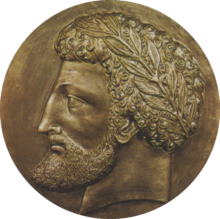Massinissa
Massinissa (also Masinissa ; Greek Massanasses , Central Atlas Tamazight ⵎⴰⵙⵏⵙⵏ Masnsen ; * 238 BC ; † 149 BC ) was first king of the Massylians or eastern Numidians and later king of all Numidia (201 to 149 BC) .). From 213 to 206 BC He was in league with Carthage , but then made a pact with the Romans . In the end he was one of the Punic’s fiercest opponents .
Life
Massinissa was born the son of Prince Gala (also Gaia ) from the tribe of the Massylians . He spent his youth in Carthage and got engaged to Sophonisbe , a daughter of Hasdrubal , son of Gisgos. He was educated in Carthage and trained in Punic war techniques. In a tussle with Syphax , king of the Masasylians or western Numidians, who was on the Roman side, Massinissa allied herself with Carthage during the 2nd Punic War (218 to 201 BC) and took Hasdrubal together with a Punic army participated in their battles against Syphax until he was forced to make peace with Carthage.
212 BC He crossed over to Spain with Hasdrubal, where he and his Numidian riders made a decisive contribution to the victory over the brothers Publius Cornelius Scipio and Gnaeus Cornelius Scipio Calvus . He also took part in the war in Spain on the Carthaginian side in the following years.
When the fortunes of war turned to the Romans, he swung over to their side, not least caused by Hasdrubal, who had married his daughter Sophonisbe to arch rival Syphax for political reasons, which had deeply offended Massinissa. He now supported Rome in the fight against Carthage and supplied the Roman armed forces with grain, soldiers and war elephants. After he returned to Africa, he was beaten by Syphax and driven from eastern Numidia. When Scipio the Elder in 204 BC When he landed in Africa, he could only find himself as a refugee.
Massinissa, however, rendered important services to the Romans in the battles; in particular he contributed to the attack through which 203 BC The armies of Hasdrubal and King Syphax were destroyed, significantly contributing to the victory. Together with Laelius , Massinissa made an incursion into the realm of Syphax in the same year, which at the end of 202 BC. Was defeated and captured. Since Sophonisbe fell into his hands as the spoils of victory, he married her. Because Scipio demanded her extradition, he handed her the poison cup himself.
With Roman help he had prevailed against Syphax. In peace with Rome, Carthage had to recognize Massinissa as King of Numidia and cede territories in Tripolitania to him. As a reward for the services rendered, he received the kingdom of Syphax. The Medjerda Valley (the river was then called Bagradas ) was wrested from Punic rule. Cirta , today's Constantine in Algeria , became the capital of Numidia .
In the peace dictate, the Carthaginians were given 201 BC. Brought back to the ally Massinissa everything that was snatched from him or his ancestors by them. This provision was used by him during his long reign to wrest part of their territory from the Carthaginians, who had been forbidden to wage war in Africa without the permission of the Romans. At the same time, Rome's ally nourished and increased support for him in the city. There were three parties there that feuded with each other: a Roman-minded, one in the service of the Massinissa and a people's party.
The Carthaginians sought protection from the Romans in vain; these either made no decision or a decision that was unfavorable to the Carthaginians. 151 BC The Massinissas party was driven out of the city by the Carthaginians and they finally attacked 150 BC. To arms. However, the army of their general Hasdrubal was defeated by Massinissa. The general had to enter into a contract in which he undertook for the Carthaginians to renounce all disputed territory and to pay 5,000 talents of silver; the rest of his army had to withdraw without weapons, but were attacked on the way by Gulussa , the son of Massinissa, and largely killed.
However, when the Romans used Carthage's breach of treaty to declare the third Punic War , Massinissa realized too late that in his hatred of Carthage he had merely promoted Rome's superiority to the detriment of his own empire. He was reluctant to support the Romans, but died at the beginning of the war in 149 BC. BC, 90 years old. At the request of the dying Massinissa , the Numid Empire was distributed by Scipio the Younger among the royal sons Micipsa , Gulussa and Mastanabal .
literature
- Elfriede Storm: Massinissa. Numidia on the move (= writings of the Scientific Society at the Johann-Wolfgang-Goethe University in Frankfurt am Main. Vol. 16). Steiner, Stuttgart 2001, ISBN 3-515-07829-0 .
Web links
- Jona Lendering: Massinissa . In: Livius.org (English)
Individual evidence
- ↑ Theodor Mommsen: Roman History , Volume 2, From the Battle of Pydna to Sulla's Death , 4th edition, page 33. Berlin 1865. , queried on January 13, 2011
| personal data | |
|---|---|
| SURNAME | Massinissa |
| ALTERNATIVE NAMES | Masinissa; Massanasses (Greek) |
| BRIEF DESCRIPTION | King of Numidia |
| DATE OF BIRTH | 238 BC Chr. |
| DATE OF DEATH | 149 BC Chr. |
